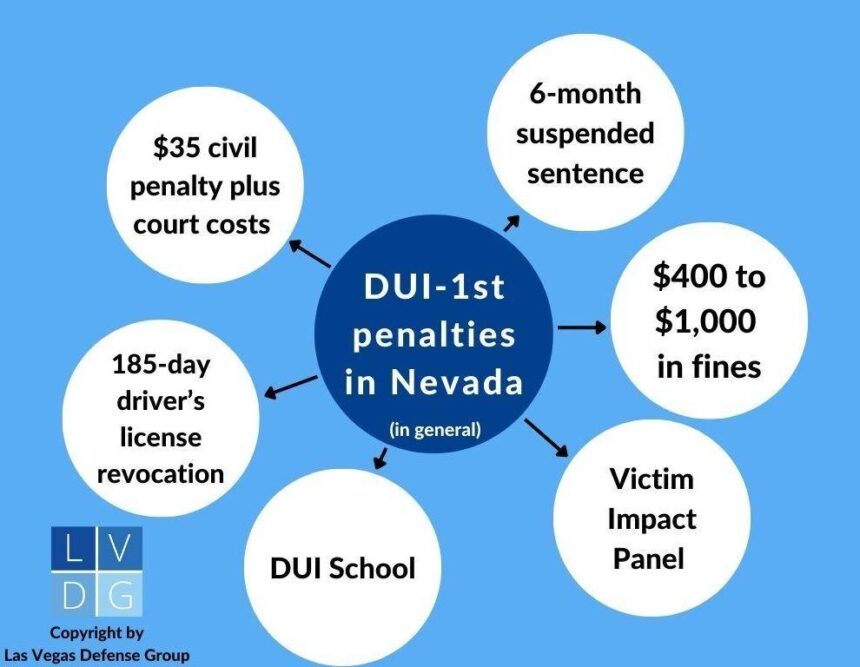Debate Intensifies Over Stricter DUI Laws in Nevada Amid Calls for Balanced Reform
Challenges in Passing Harsher DUI Penalties in Nevada
Legislative efforts in Nevada to impose more severe consequences for driving under the influence (DUI) offenses have encountered significant opposition,stalling progress on proposed reforms. Lawmakers initially sought to establish a mandatory minimum prison term of two years for repeat DUI offenders, aiming to enhance deterrence and improve road safety. However, this initiative has sparked intense discussions regarding the fairness and effectiveness of such rigid sentencing, leaving the future of tougher DUI regulations uncertain in the state.
The debate centers on several critical issues:
- Mandatory Minimum Sentences: Critics argue that a fixed two-year incarceration period may be disproportionately harsh, especially for first-time or less severe cases, advocating instead for more individualized sentencing.
- Judicial Flexibility: Concerns have been raised that mandatory penalties could undermine judges’ ability to tailor sentences based on the nuances of each case.
- Victim and Family Perspectives: Families affected by DUI-related tragedies demand stronger accountability measures to prevent future incidents and honor victims’ memories.
| Group | Primary Concern | Suggested Modification |
|---|---|---|
| Legislators | Balancing punishment with rehabilitation | Introduce alternatives to mandatory incarceration |
| Victims’ Families | Ensuring offenders face meaningful consequences | Support for extended mandatory sentences |
| Defense Lawyers | Preserving fair trial and sentencing discretion | Oppose rigid sentencing mandates |
Voices from Families: Calls for Stronger Sentencing and Accountability
Those personally impacted by DUI incidents in Nevada have voiced strong dissatisfaction with the proposed two-year minimum sentence for repeat offenders. Many feel this penalty does not sufficiently reflect the gravity of the harm caused. One relative of a victim described the sentence as “a mere slap on the wrist,” emphasizing the need for more stringent measures to deliver justice and deter dangerous behavior.
Community advocates highlight several points for reconsideration:
- Nevada’s proposed sentencing falls short compared to neighboring states with tougher DUI laws.
- Effective reform should combine punitive measures with comprehensive rehabilitation programs.
- Families seek enhanced offender accountability to reduce the risk of repeat offenses.
| State | Minimum Sentence for Repeat DUI Offenders |
|---|---|
| Nevada (Proposed) | 2 years |
| California | 3 years |
| Arizona | 4 years |
| Texas | 2 to 5 years |
Expert Perspectives: Evaluating the Impact of Stricter Sentences on DUI Rates
As the debate unfolds, experts remain divided on whether imposing longer prison terms effectively reduces drunk driving incidents. Some criminologists point out that evidence linking harsher sentences to lower recidivism is mixed. Instead, they suggest that alternative strategies—such as enhanced public education and addiction treatment—may produce more sustainable outcomes.
Families affected by DUI offenses express a range of opinions:
- Some advocate for tougher penalties to ensure justice and recognition of victims’ suffering.
- Others caution that overly punitive approaches might overwhelm the judicial system without addressing underlying causes.
- Many support a balanced framework that combines accountability with rehabilitation.
| Argument | Supporting Data | Counterarguments |
|---|---|---|
| Stricter Sentences Reduce Crime | Short-term declines in repeat offenses observed in some studies | Effectiveness varies widely depending on individual factors |
| Emphasis on Rehabilitation | Programs shown to lower addiction-related DUI recidivism | Perceived as too lenient by some victims’ advocates |
| Judicial and Systemic Burden | Data highlights prison overcrowding and increased costs | Calls for alternative sanctions to alleviate system strain |
Advocating for a Holistic Strategy: Education,Treatment,and Accountability
Many stakeholders argue that simply lengthening prison sentences will not sufficiently address Nevada’s DUI challenges. Instead, a comprehensive approach that combines public education campaigns about the dangers of impaired driving with effective rehabilitation services for offenders is recommended. Evidence from other states indicates that integrating these elements leads to more meaningful behavioral change and lower rates of repeat offenses.
Key components of this multi-pronged strategy include:
- Mandatory alcohol awareness and safety courses for all DUI offenders,irrespective of prior convictions
- Access to counseling and addiction support groups to address root causes of impaired driving
- Community service programs that foster duty and restitution
- Installation of ignition interlock devices to prevent offenders from driving under the influence again
Below is a comparison of outcomes between strict incarceration policies and combined educational and rehabilitative approaches over a five-year period:
| Approach | Recidivism Rate | Public Approval | Cost Efficiency |
|---|---|---|---|
| Mandatory 2-Year Sentence | 30% | 55% | Moderate |
| Education & Rehabilitation Mix | 15% | 75% | High |
Proponents believe that broadening the focus beyond incarceration not only supports community healing but also encourages offenders to seek help,ultimately fostering safer roadways throughout Nevada.
Conclusion: Navigating the Complex Path Toward Effective DUI Reform in Nevada
As Nevada continues to confront the tragic consequences of impaired driving, the conversation around appropriate legal responses remains highly polarized. While lawmakers deliberate on the merits of tougher DUI penalties, families affected by these incidents call for more impactful and comprehensive solutions. The ongoing stalemate underscores the difficulty of crafting policies that balance justice, rehabilitation, and public safety—a challenge that demands continued dialog and innovative approaches to reduce the human toll of drunk driving in the Silver State.
